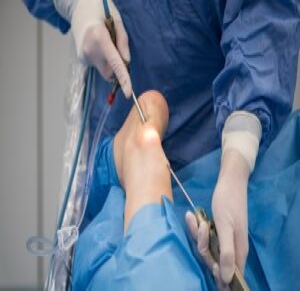Your Recovery
An Achilles tendon repair reconnects the ends of the broken tendon so that one can use their foot for regular activity. There are two types of surgery. First is when a doctor makes an incision at the back of the leg. Then there is percutaneous surgery, where the doctor uses several smaller cuts and inserts tools to assist in repair.
After surgery, one can feel tired and lethargic for several days. It’s common for the lower leg and ankle to be swollen. You may also experience numbness around the incision/s. Further, your ankle and shin may be bruised. Ice can help to reduce swelling, and you should feel better after several days of rest.
During recovery, your tendon will slowly get stronger. It’s common that you will need to wear a cast or a walking boot for 6 to 12 weeks post-surgery. After a few weeks, you may be able to put weight on your leg, however, it will be several months before you have complete use of your leg and ankle. You will need to build your strength with rehabilitation through rehabilitation exercises.
How soon you can return to sports or other exercise depends on how well you follow your rehab program and how well your tendon heals. Your doctor or physiotherapist will monitor your progress and often trry to give you an achievable yet cautious timeline of when you can return to your activities. Most people are back in action (mildly) in about 4 to 6 months.
How can you care for yourself at home?
Activity
- Rest when you feel tired. Getting enough sleep will help you recover, and sleep with your leg raised.
- You will need to wear a cast or walking boot that keeps your foot and ankle from moving for 6 to 12 weeks after surgery.
- You may use crutches to move around the house so you can keep weight off your leg.
- You are able to shower 24 to 48 hours after surgery, if your doctor okays it. Just ensure you keep your bandage and incision dry. It is not uncommon for people to get a shower stool to sit on. If your doctor does not want you to shower or remove your brace, you can take a sponge bath.
- Do not take a bath, swim, use a hot tub, or soak your leg until your doctor approves it.
- Avoid driving for a minimum of 6 weeks.
- Generally, one can return to work after 6-8 weeks of healing.
Medicines
- Your doctor will advise you if and when you can restart your medications. He or she will also give you instructions about taking any new medicines.
- If you take a blood thinner, be sure to ask your doctor if and when to start taking it again. Do not self-prescribe.
- Take pain medicines exactly as directed. If your doctor gave you a prescription medicine for pain or antibiotics, take it as prescribed.
Incision care
- If you have a bandage over your incision after surgery, keep the bandage clean and dry at all times. It’s essential that you follow your doctor’s orders and only remove the application when he or she approves for you to do so.
- If you have strips of tape on the incision, leave the tape on until it falls off.
- If you have a splint or cast, keep it dry, do not put anything, including powder, between the splint or cast and your skin.
Exercise
- Exercise in a rehab program is an integral part of your treatment. Your first (and basic) exercises will help you regain flexibility. They may also keep scar tissue from forming around the tendon.
Ice and elevation
- To reduce swelling and pain, put ice or a cold pack on your leg for 10 to 20 minutes at a time. Do this every few hours for the first 48 hours.
- Keep your leg elevated as often as possible for the first 72 hours post-surgery. This will help reduce swelling.
- If your doctor has provided support stockings, wear them as long as instructed. These help to prevent blood clots.
Stick to and attend all post-op appointments. Follow-up care is a key part of your treatment and safety. And if you feel something is off (besides the obvious), inform your doctor immediately.
Dr. Bagwe is a leading orthopedic surgeon specializing in ankle and foot reconstruction. If you are looking for an orthopedic surgeon near you then look no further. Dr. Bagwe is an industry leader when it comes to foot and ankle surgery doctors in St. Louis. Dr. Bagwe and his friendly and professional team is ready to welcome you and tell you everything you need to know.
Reach out and contact us today.






